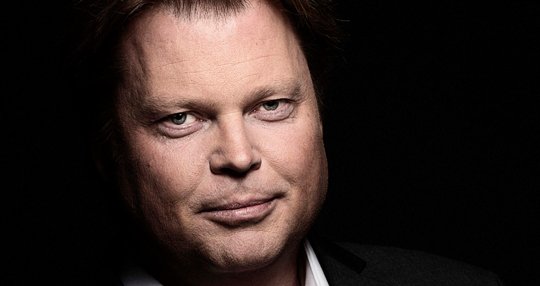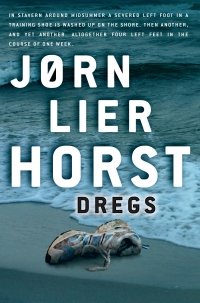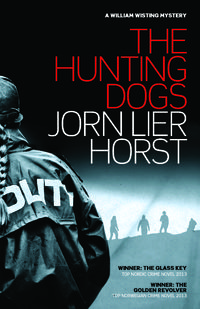
When he won the Glass Key Award for his novel The Hunting Dogs last year, Jørn Lier Horst joined an elite band of Scandinavian crime authors that includes Jo Nesbo, Karin Fossum, Stieg Larsson and Arnaldur Indridason. And with three of his novels now translated in to English, and a fourth on the way, his reputation outside of the Nordic world is growing quickly. Our review of The Hunting Dogs is on its way – it comes out as a paperback in the UK on 19 June – so we decided to invite Jørn Lier Horst over to Crime Fiction Lover to tell us about how his background as a police investigator has contributed to his approach to writing crime novels…
You worked as a policeman in Norway for 18 years. What was your role with the police, and how has the experience shaped you as a crime writer?
I worked as a chief investigator. That position has in many ways shaped me as a human being. It is visible in my books. The police force provides an excellent vantage point for observing society, as well as an excellent starting point for writing realistic crime fiction.
What things did you observe about detectives that have helped you depict them in your books, and the same for criminals?
My work as a detective allowed me to go behind the police barricades, into the crime scenes where I walked among the remnants and traces of serious crimes. I’ve met people who were the victims of crimes, often only those who were dependents and survivors. And for many years it was my job to talk to the people who had carried out the crimes; it was my job to interrogate the perpetrators. To stand face to face with anger, grief, despair and remorse have been valuable to me. It has taught me a lot about life and I think it creates an authentic nerve in my books.

We reviewed your book Dregs when we first started the site and really liked it. I thought William Wisting was a precise and measured man, with a dry sense of humour. And, I thought the writing was precise and measured as well. How much is Wisting based on yourself, and what aspects of him are from your imagination?
Being fed up with all the drunkards who solve crimes in Norwegian literature, I made William Wisting more sympathetic – more like the cop I knew from my everyday work. He is an upright and good policeman, but first and foremost a good-hearted and sincere person. He is a careful and concerned investigator, without great thought for himself, but an engagement with society beyond the individual and a legitimate involvement with his fellow human beings. Of course it’s conceited to say those aspects of him come from me personally, but he has in him a bit of me and a bit of my father-in-law, who was an extremely sociable and well-liked policeman.
Tell us about The Hunting Dogs – what challenges does Wisting face here, and what will crime fiction lovers love about this book?
Seventeen years ago William Wisting led the investigation into one of Norway’s most notorious criminal cases, the murder of young Cecilia Linde. When it is discovered that evidence was falsified he is suspended from duty, it looks like a man has been wrongly convicted, and suddenly the media are baying for blood. Wisting, who has spent his life hunting criminals, is now the hunted.
It is a story about how police can make mistakes and commit errors, and the ability to correct them. About abuse of power, betrayal, lies, suppression and profound guilt. A story that not only tells what the investigator does with a case, but what the case does to him.
It won the Glass Key Award as the best Scandinavian novel last year. How did that feel, and what has it done for you as a writer?
We are probably experiencing a period that has to be regarded as a golden age for Scandinavian crime fiction. Never before have so many Scandinavian authors written so many top-notch crime novels. Receiving the Glass Key for having written Scandinavia’s best crime novel is a form of recognition I really appreciate. It makes me stronger in the belief that what I write means something for others.

There are nine William Wisting books and only the three most recent are available in English. Can you give us any news on plans to translate the others?
The next book to be translated is The Caveman, the ninth installment in the series. I think it is scheduled for release in May next year. Whether the publisher will go back and translate previous releases remains to be seen.
Would you prefer it if they’d been translated in order?
The releases begin in the middle of the series and that happens in most countries where my books are translated. One should perhaps always start at the beginning, but to be honest my latest books are better than the first.
What are you working on now and can you tell us more about it?
In Norway, I have a mystery series for children and young people which has become very popular. Book number six comes out right after the summer. At the moment I’m starting work on the 10th book in the Wisting series, which comes out in Norwegian in 2015. It is currently untitled.
Who are your favourite crime authors and why? How much have they influenced you?
I have no favorite author, but I would probably not have been the writer I am without Henning Mankell – probably would not have been the same cop either. My first encounter with Mankell was the first novel about Kurt Wallander, Faceless Killers, published in Norwegian in 1993. I read it during my studies at the police academy and thought he was the kind of policeman I would like to become – an upright and good detective who led the work with major cases. Thus Mankell and Wallander staked out my career and the role I had for many years as chief investigator for the police.









